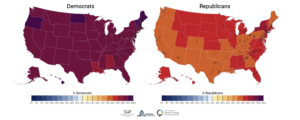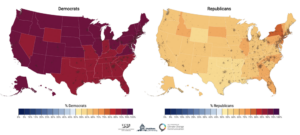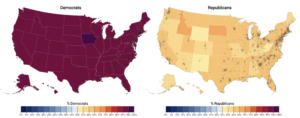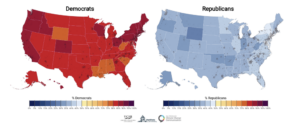Climate Note · Jun 18, 2020
Explore climate opinion across political lines with our Partisan Maps
By Anthony Leiserowitz, Jennifer Marlon, Xinran Wang, Peter Howe, Matto Mildenberger, Matthew Ballew and Surbhi Bharadwaj
Filed under: Beliefs & Attitudes
Today we are pleased to announce a new version of our Yale Republican and Democratic Climate Opinion Maps, including a new interactive mapping tool that allows you to compare Republican and Democratic views side-by side.
A few years ago, we constructed a statistical model and interactive maps to estimate partisan climate opinions at the national, state, and congressional district levels (Mildenberger et al., 2017 – Party registration data is only available for 32 states. In the remaining states, party registration is imputed). Today, we have updated the tool to allow easier comparisons between Democratic and Republican views in side-by-side maps (through 2018).
The following maps illustrate state-level support for a few climate and energy policies across party lines. The colors reflect the average opinions of the population within each state. States with majority support within each party are colored in shades of red, and states with less than majority support are depicted in shades of blue. Places with population densities of at least 100 people per square kilometer are indicated by small gray dots on the maps – a useful reminder that the U.S. population is not equally distributed across the country.
Although Americans are often politically divided about the causes and seriousness of climate change, it is also important to note that there is strong public support, across party lines, for a variety of climate and renewable energy policies.
For example, majorities of Republicans and Democrats in every state and congressional district support funding research into renewable energy sources. Nationally, a vast majority of both (93% of Democrats and 80% of Republicans) support such funding – a relatively narrow 13 percentage point difference. Even across the 50 states, the range of variation in support for renewable energy is quite small: 76% of Republicans in Texas support research funding compared to a high of 85% of Republicans in New York, for instance. For Democrats, support is lowest in Alabama (89%), while it is over 95% in most New England states.
Support funding research into renewable energy sources
There is also bipartisan support for regulating carbon dioxide as a pollutant. Nationally, about 90% of Democrats and 60% of Republicans support regulation of carbon dioxide, which accounts for 81% of U.S. greenhouse gas emissions. Republican support for market-driven solutions led to the adoption of the first “cap-and-trade” system to reduce sulfur dioxide emissions in 1990, although Republican support for such policies have since declined due in part to widespread fossil fuel industry-funded misinformation campaigns.
Support regulating CO2 as a pollutant
We also find a bipartisan consensus across all states that schools should teach children about the causes, consequences, and potential solutions to global warming. Nationally, a majority of both Democrats (93%) and Republicans (61%) support global warming education, with majority support in all 50 states.
Believe schools should teach people about the causes, consequences, and potential solutions to global warming
Greater partisan differences emerge on questions about who should take action to address global warming. While 54% of Republicans believe that corporations should do more to reduce global warming, 86% of Democrats support greater action by corporations. Fewer in both parties (46% of Republicans compared to 83% of Democrats) believe that citizens should do more to reduce global warming, and only 40% of Republicans compared to 85% of Democrats think Congress should do more. The regional divides on taking action become starker too: in New York state, 50% of Republicans and 85% of Democrats say Congress should do more. In contrast, in Wyoming only 29% of Republicans compared to 77% of Democrats say Congress should do more.
Think Congress should do more to address global warming
We invite you to explore the results using our interactive Partisan Maps, which display Republican and Democratic views at the national, state, and congressional district levels. We hope this tool can help you in your own efforts to communicate climate change science and solutions.
If you or your organization want to discuss how these data can help inform your climate communications strategy, please reach out to our partnerships team: ypccc.partners@yale.edu.



